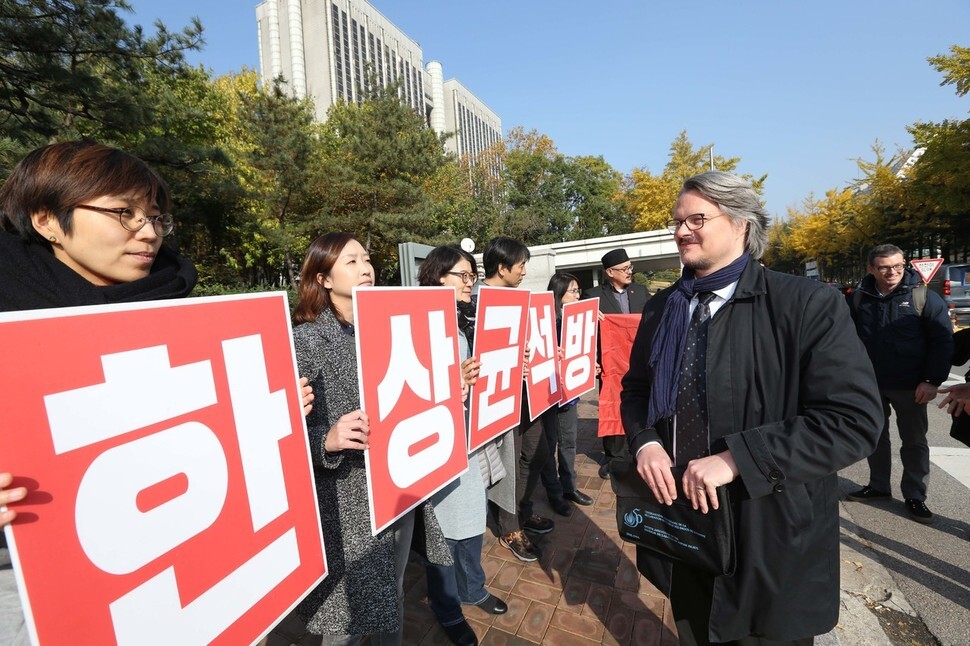hankyoreh
Links to other country sites 다른 나라 사이트 링크
In labor leader’s case, “the courts are the guardian of human rights”

On the afternoon of Nov. 8, a hearing was held in the second criminal division of Seoul High Court, which is reviewing an appeal by Korean Confederation of Trade Unions President Han Sang-gyun. Three witnesses called by Han’s attorneys testified before the court that barricades of police vehicles had been set up in front of the procession during the rally and that the police had resorted to excessive force, such as the water cannon that they fired at the late farmer Baek Nam-ki.
In July, Han was convicted of obstructing justice by organizing the rally on Nov. 14, 2015, and sentenced to five years in prison. Seated in the front row was Jan Erik Wetzel, 46, senior policy advisor for the East Asia office of Amnesty International, diligently recording what the prosecutors were saying in their cross-examination with the help of an interpreter. Wetzel had flown to South Korea on the evening of Nov. 7 to watch Han’s appeal.
“The prosecutors’ indictment of Han Sang-gyun was political, and what is left now is the courts. The courts are the guardian of human rights, and they must now put a halt to the police and the prosecutors’ oppression of protestors,” Wetzel said in a voice that was calm but firm.
Wetzel believes that it was wrong of prosecutors to blame Han for the violent acts at the demonstration. “When more than 100,000 people are part of a protest, you can’t predict what everyone is going to do. Both international human rights laws and the criminal code state that people can only be held responsible for their own actions,” he said.
Wetzel also expressed his regret for the lower court’s conclusion that Han could have predicted that violent actions would take place at the demonstration and that he did not take reasonable measures to prevent the violence. “The mood at a demonstration is also affected by how the police use their authority. When the police resort to physical force, feelings run high among the protestors, but when the police are more tolerant, it’s much more likely that the protestors will remain peaceful,” he said.
As an example, Wetzel noted that a demonstration on Nov. 5 attended by more than 200,000 people had ended peacefully. “The police kept their distance from the protestors, and the protestors were able to express their opinions. The question of whether problems will occur at a protest depends not only on the organizers but also on what actions the police take,” he said.
Wetzel also expressed his concern about the politicization of the prosecutors and the police. “I’m not sure why the authorities are so quick to suppress the leaders of labor unions and protestors while being so slow to deal with problems in their own ranks,” he said, referring to the slow pace of the investigation into the Baek Nam-ki incident (Baek died after being hit by a police water cannon, and last weekend he was buried).
There was one thing that Wetzel really wanted to say to South Korea’s courts: “The institutions of the state are also obligated to promote the expression of public opinion. I hope that the judiciary will prove itself a guardian of the freedom of expression and the freedom of assembly by making a wise ruling in Han’s case.”
By Hyun So-eun, staff reporter
Please direct questions or comments to [english@hani.co.kr]

Editorial・opinion
![[Column] The state is back — but is it in business? [Column] The state is back — but is it in business?](https://flexible.img.hani.co.kr/flexible/normal/500/300/imgdb/original/2024/0506/8217149564092725.jpg) [Column] The state is back — but is it in business?
[Column] The state is back — but is it in business?![[Column] Life on our Trisolaris [Column] Life on our Trisolaris](https://flexible.img.hani.co.kr/flexible/normal/500/300/imgdb/original/2024/0505/4817148682278544.jpg) [Column] Life on our Trisolaris
[Column] Life on our Trisolaris- [Editorial] Penalties for airing allegations against Korea’s first lady endanger free press
- [Editorial] Yoon must halt procurement of SM-3 interceptor missiles
- [Guest essay] Maybe Korea’s rapid population decline is an opportunity, not a crisis
- [Column] Can Yoon steer diplomacy with Russia, China back on track?
- [Column] Season 2 of special prosecutor probe may be coming to Korea soon
- [Column] Park Geun-hye déjà vu in Yoon Suk-yeol
- [Editorial] New weight of N. Korea’s nuclear threats makes dialogue all the more urgent
- [Guest essay] The real reason Korea’s new right wants to dub Rhee a founding father
Most viewed articles
- 1Amid US-China clash, Korea must remember its failures in the 19th century, advises scholar
- 2[Column] Why Korea’s hard right is fated to lose
- 3[Column] The state is back — but is it in business?
- 4Trump’s talk of flouting NATO promises sparks apprehension in Seoul
- 560% of young Koreans see no need to have kids after marriage
- 6New sex-ed guidelines forbid teaching about homosexuality
- 7Presidential office warns of veto in response to opposition passing special counsel probe act
- 8[Column] Can Yoon steer diplomacy with Russia, China back on track?
- 9[Guest essay] Maybe Korea’s rapid population decline is an opportunity, not a crisis
- 10[Reporter’s notebook] In Min’s world, she’s the artist — and NewJeans is her art